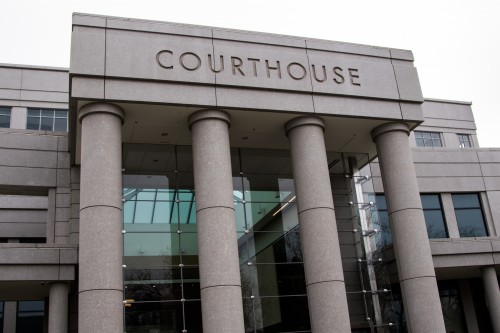

By Ivan Villegas and Kimberly Torres
WOODLAND, CA – Deputy Public Defender Martha Sequeira argued against the prosecution’s motion to admit evidence of prior uncharged acts of domestic violence in a domestic violence trial this Monday in Yolo County Superior Court.
DPD Sequeira said, “I did the research on their number one (charge) and I disagree with that… The authority they (the prosecution) use to support their argument is not applicable.”
Judge Tom Dyer began the day, which was still at the jury selection stage, by asking the two attorneys whether or not they would be ready to start the trial later this week.
Deputy District Attorney Preston Schaub agreed, however, DPD Sequeira said, “It’s hard to say… because there are some issues that are ripe for some bias and some prejudice based on some charges and some cultural issues and things of that nature.”
Then, Judge Dyer attended other cases before returning to this case and giving the standard instructions on court practices during trial.
Neither attorney brought up any issues with these, except for the possibility of a bifurcated trial that DPD Sequeira said would depend on the judge’s decision on one of her issues with the prosecution’s motions in limine.
Judge Dyer asked both attorneys if there were any motions in limine, for permission to introduce evidence.
DDA Schaub said that he had filed some, and most had been resolved after Judge Dyer gave his instructions on court practices, save for the first motion relating to the first charge of violating a protective order with a prior conviction.
DDA Schaub had filed an 1109 motion (Evidence Code § 1109) seeking to introduce evidence from an uncharged act of domestic violence, to which DPD Sequeira opposed by arguing that it should be left out of this case.
This would help convict the accused by using more than just the current facts, Sequeira argued.
DDA Schaub stated that “the prior restraining order violation is an element of Count 1. So it does make it highly relative and probative, so we would have to admit that evidence in some way just to prove Count 1.”
Judge Dyer once again turned to DPD Sequeira after her vehement rejection of the prosecution’s argument.
“No, the government is absolutely incorrect. And the part of the element that the prosecution needs to prove for Count 1 about the prior conviction, again, is a sentencing enhancement. It’s not a guilt finding,” said DPD Sequeira.
The public defender added, “So that was what the defense was referring to earlier when I said that if the court were to make rulings on the in limine motions that may trigger a bifurcation of an element for a count.”
In response, DDA Schaub said, “I don’t view it so much as a sentencing enhancement as a separate charge altogether, hence why it’s enumerated with its own subsection D. So I believe it is an element of the crime as charged.”
Schaub added, “As far as the way we handle that with bifurcation or having that presented to the jury in the case in chief, I think that’s up to the discretion of the court.”
Judge Dyer said the decision on whether or not to bifurcate the case would depend on whether the prior conviction leading to a violation of the protective order is a part of the underlying crime or a sentencing enhancement.
In the afternoon, Judge Dyer, granting the motion, stated that “breaking the victim’s face is evidence enough granting a 1109 motion.”





